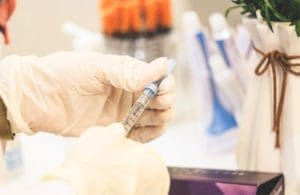
[Image by Sam Moqadam on Unsplash]
According to Victor Bornstein, CEO of Justpoint (New York City), the vast majority of those claims have targeted medical malpractice, an AI company specializing in malpractice. “The healthcare system was under a lot of stress, and more mistakes tend to happen,” Borstein said.
There hasn’t been a surge in cases related to the pandemic against pharmaceutical companies, whose COVID-19 therapies are legally shielded from lawsuits.
But the FDA’s and CDC’s joint decision to pause the use of Johnson and Johnson’s COVID-19 vaccine could lead to renewed focus on potential adverse events linked to COVID-19 vaccines.
Pharmaceutical companies themselves “cannot be sued for money damages in court” over possible injuries related to COVID-19 vaccines or therapeutics.
COVID-19 vaccines and therapeutics are, however, covered under the U.S. government’s Countermeasures Injury Compensation Program (CICP).
The program has “strict criteria,” Bornstein said.
“If someone had an issue with a COVID-19 vaccine, it’s going to be complicated for them” to be compensated, Bornstein concluded.
For one thing, payouts are limited in size.
“There’s also the question of causation,” Bornstein said. While events like anaphylaxis are relatively simple to associate with a vaccine, many side effects aren‘t. “In general medical practice, it’s easier to understand [adverse events] because you have more medical records,” he added.
But if someone who receives a vaccine develops, for instance, Bell’s palsy, it can be challenging to prove causation as the condition itself is idiopathic.
“In cases like this, the lawyers who get involved do research. It almost becomes like a scientific study,” Bornstein said. “The question becomes: ‘Are attorneys confident they will receive a payout after engaging in such extensive research?’”
But if a side effect occurs more often in the population who has received a vaccine, it is important for those experiencing the adverse events to document it. “The overall population needs to know,” Bornstein said.
“What we do know is that COVID kills,” Bornstein said. And the more people who receive the vaccine, the more functional immunity will exist across society, which will translate into fewer deaths in the long run.
Understanding the ultimate benefit-risk ratio for COVID-19 vaccines and therapeutics is a more significant undertaking, Bornstein said. “These things take time.”
Filed Under: Infectious Disease





Tell Us What You Think!
You must be logged in to post a comment.